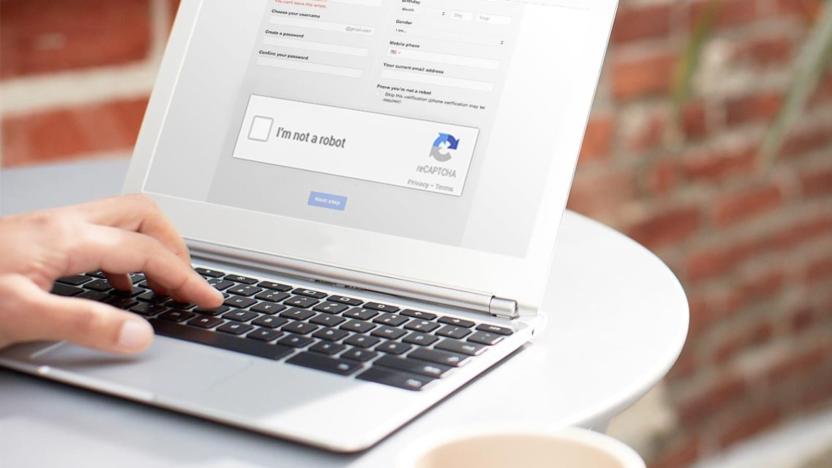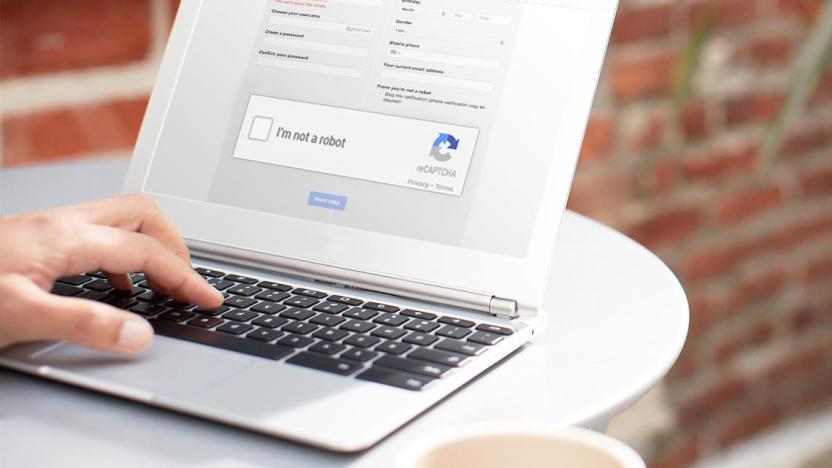recaptcha
Latest

Google's new reCAPTCHA doesn't require a click
Google first launched its bot-detection reCAPTCHA system in 2007, which means that for over 10 years we've been deciphering garbled text, identifying street lights and clicking tiny boxes in a bid to prove we're human and subsequently access the sites and pages we want to view. But not anymore. Google's reCAPTCHA v3 completely eliminates the need for user interaction, instead relying on adaptive risk analysis to pick up suspicious traffic.

Google's reCAPTCHA can tell you're not a bot from your phone
Google's reCAPTCHA has evolved from distorted text, to street numbers, to "I'm not a robot" tickboxes and, most recently, to their new invisible system. And now the company is bringing its bot-fighting program to Android.

Google's new reCAPTCHA automatically tells you're not a bot
Over the years, Google has utilised a number of methods to distinguish between human and bots on the web. Its take on the CAPTCHA (Completely Automated Public Turing test to tell Computers and Humans Apart) test, known as reCAPTCHA, has required you to transcribe distorted words, confirm Street View addresses or simply just tick a box. Soon, you won't need to do the hard work, because Google's making the system invisible.

Google now lets you prove your humanity with a single click
There's something just a little insulting about having to prove your humanity to some website by pecking out some distorted words, but Google's rolling out a new, less tedious way for web developers to tell if you've got blood or oil pumping through your veins. All you'll have to do is tick a box on a desktop site or match related images on your phone et voila -- you're in. Most of the time, anyway.

Daily Roundup: Street View vs. captchas, living in a connected home and more!
You might say the day is never really done in consumer technology news. Your workday, however, hopefully draws to a close at some point. This is the Daily Roundup on Engadget, a quick peek back at the top headlines for the past 24 hours -- all handpicked by the editors here at the site. Click on through the break, and enjoy.

Google's latest Street View algorithm beats its bot-sniffing security system
You know how Google's been doing such a great job associating addresses with their locations on a map? Apparently, it's all thanks to the company's new magical algorithm that can parse (with 90 percent accuracy) even fuzzy numbers in pictures taken by Street View vehicles. In fact, the technology's so good that it managed to read even those headache-inducing swirly reCAPTCHA images 99 percent of the time during the company's tests. While that proves that the system works really well, it also implies that the distorted Rorschach-like puzzles are not a fool-proof indicator of whether a user is human.

Google reCAPTCHAs now featuring Street View addresses, 221b Baker St. to get even more famous
If you've enjoyed decrypting the often frustratingly skewed (and occasionally humorously juxtaposed) reCAPTCHAs, you might be a bit sad to learn that Google is mixing things up with some rather more boring numerals. The combinations of two words are typically used as part of a registration form to ensure the registrant is, indeed, human. Google is now replacing one of the words in some of its reCAPTCHA forms with photos gleaned from Street View service. Google says it uses these numbers internally to improve the accuracy of Street View and that pulling them into reCAPTCHAs is part of an "experiment" to "determine if using imagery might also be an effective way to further refine our tools for fighting machine and bot-related abuse online."In other words, Google's bots are already capable of decoding these numbers, which makes this all sound like a bit of a challenge to the rest of the OCR-loving coders in the world. Any takers?[Image Credit: dirtbag]

Stanford program cracks text-based CAPTCHAs, shelters the replicants among us
CAPTCHAs. In the absence of a Voigt-Kampff apparatus, they're what separate the humans from the only-posing-to-be-human. And now three Stanford researchers have further blurred that line with Decaptcha, a program that uses image processing, segmentation and a spell-checker to defeat text-based CAPTCHAs. Elie Bursztien, Matthieu Martin and John Mitchell pitted Decaptcha against a number of sites: it passed 66% of the challenges on Visa's Authorize.net and 70% at Blizzard Entertainment. At the high end, the program beat 93% of MegaUpload's tests; at other end, it only bested 2% of those from Skyrock. Of the 15 sites tried, only two completely repelled Decaptcha's onslaught -- Google and reCaptcha. So what did the researchers learn from this? Randomization makes for better security; random lengths and character sizes tended to thwart Decaptcha, as did waving text. How long that will remain true is anyone's guess, as presumably SkyNet is working on a CAPTCHA-killer of its own.







